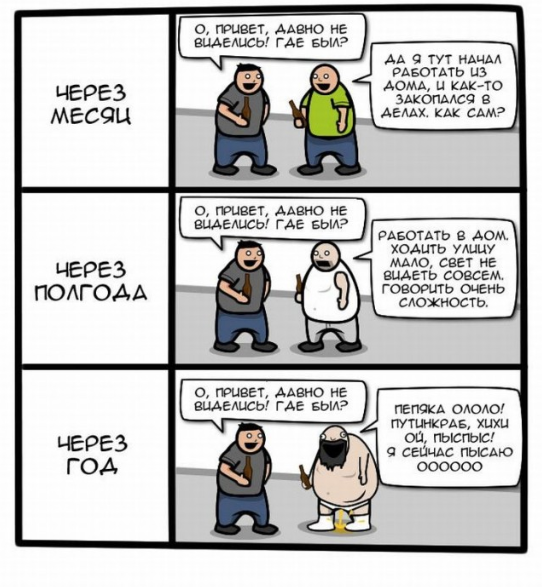
Content
1. First job
2. The first economic crisis and the first udalenka
3. A year in two
4. We conquer Moscow without leaving home in the province
5. The second (currency) economic crisis
6. Meanwhile, in Russia
7. What now?
8. Conclusions / Pros / Cons
9. FAQ
First job
2006, I am 21, I graduate from the university with a degree in computer science in economics. Where we were taught to program in Pascal, design, relational databases, four types of accounting and GOST 19 and 34 groups. In combination, I work in a computer company for the repair, sale of computers and software.
They give me the task to go to one state institution at the city administration, to sign acts on the supply of computer hardware. This institution specialized in the implementation of IT solutions and the development of software for the needs of the city and, by an unknown coincidence, was located on Bobruiskaya Street.
By signing the acts with the director, I decided and blurted out the phrase “I want to work with you as a programmer”, briefly described my higher education and what I can do. And at that time I was able to sculpt crafts in C #. Fortunately, some time before this, Microsoft organized a seminar for programmers at which it issued discs with licensed copies of Visual Studio 2005 and SQL Server 2005. I fussed, bought and read the thick book “C #” by Carly Watson. Fate was favorable to me and after a while they called me and offered to make a project. So I got my first job.
Contrary to expectations, this government agency was quite at the level and professionally performed its functions. Some processes were set up in the development department, the project team consisted of a designer (director) and programmer, and the Visual Source Safe version control system was used. There was clean waterfall. The directors wrote technical assignments, they were signed by large bosses in the long corridors of state power. Then the task went down to the programmer. Testing and acceptance were done by the directors.
The projects were simple, regular CRUD plus reports in Word and Excel. WinForms first, then Web. Sometimes integration with external document management systems came across.
It was a carefree, measured and happy time. And in this company there were emotional corporate parties. Now I am nostalgic for that time. Over the next 10 years, I periodically went to tea with former colleagues, talked about my successes. But they still sat in the same classrooms, but they themselves grew up to the bosses.
The first economic crisis and the first udalenka
In 2008, a crisis struck. And my friend suggested meeting with the Dutch, they say they want to recruit programmers and revive the old project. At the meeting, they casually mentioned the remote mode of operation. I then thought in surprise: "And what could have happened like that?" Nothing came of them. But a grain of opportunity was already sown in my head.
I began to look for udalenka. Searched everywhere: on forums, on freelance exchanges, on xx.ru and superbob.
Freelance didn't work out right away. I did not understand why I should spend a lot of time searching for orders and then work for a penny, even less than my current salary at that time. A lot of inadequate customers at the level of "make me a complete analogue of classmates for 10,000 rubles." Freelance exchanges, which first ask for money for a pro account, so that I can see serious orders. How could I pay them if I have not earned a dime on their website.
Once I found a project side job. At first everything went well, I did one small project, then the second, the customer promised to pay. On the second, I made a mistake, eventually corrected it, but the customer told me that he would not pay for such work. At this moment, I made a couple of conclusions for myself: to become more adequate in the eyes of the customer / employer and henceforth no more design work without a future.
I focused on finding a full-time job. At that time (2009) on xx there were, as I recall, 54 vacancies for udalenka in my profile. I sent hundreds of responses, including for vacancies "only in the office." Along the way, I opened IE USN 6%, I thought that it would be easier for me and the employer to form a relationship.
At the end of 2009, fate threw me candy. I was interviewed in a Moscow company. The vacancy was originally in the office, I think that was lucky. And they took me to the project with a promise to think about its results about a full-time job. I already knew how to do such projects - Web, CRUD, based on the terms of reference for some government agency. I requested a “Moscow” salary. Agreed. In the aggregate, this gave the strongest motivational impetus. The first success and spending time in the evenings a couple of hours after the main job, you could earn half the provincial monthly salary.
For the new year, they prepared a gift for me. The project was completed, one of the employees quit the company, and they offered me a full time job udalenka on the same conditions.

Just come in handy IP. When I quit my main job, the head of the personnel department asked in surprise: “Where are you going? The crisis is the same, salaries are being cut, they are getting fired. ” I shrugged and answered with a smile on my face “It so happened.”
Two years
The race has begun. Moscow's fast-paced lifestyle and work drags along, even if you are thousands of kilometers from the capital. I thought I couldn't handle it. Projects are more complicated. Unknown to me subject areas (stock exchange, auctions, purchases, targeted advertising). I first worked in a real team, not two people. Tuski in fat succeeded one after another with incredible speed. It used to close 500 hours in two months. In the first year and a half, I learned more than three in the provinces. At that moment, I realized that regional projects would never catch up with capital ones. In the best case, Moscow companies will come to the regions (which later happened). Therefore, people are not needed there. Therefore, everyone goes to Moscow. Then I realized that the udalenka to Moscow is a kind of life hack. Projects are cooler, more experience, more money.
A year later, I asked for a raise, increased. After about six months, I became bored. I drew attention to the work of one of my colleagues - he created a solution framework, laid down approaches and solutions, wrote stress tests. And the team finished the business logic. He was called an architect. And I wanted to be the same.
The company said that they did not need another architect, so I began to look for work. There were a lot of interviews. Thanks to the people who pushed me to learn new things. I was prompted by many useful books (such as The Gang of Four and Martin's Principles, Patterns, and Agile Techniques.) And the blogs I read. Engaged in self-development. I tried some ideas on current projects. I again went for an interview at one of the companies where I had previously flunked him and where I was recommended to read books. As a result, I heard "We want to work with you!". It flattered. As a result, in 2012, work found me myself. Again Moscow, again removed, but I immediately outlined my goal - to become a leading programmer.
We conquer Moscow without leaving home in the province
Having worked for six months on an existing project, the company received an order from the bank to develop an intermediary system between banks and e-government services. And my project manager suggested that I do this project myself, designating the position as a tech leader. And I got the opportunity to fulfill my dream.
I was given a command. She was distributed. Project manager, business analyst and several programmers and tester in Moscow. And I and several other programmers were scattered throughout Russia and the CIS countries. At this company, the processes were better tuned than I had ever seen in the past and the future. Kanban, analysis and detailed setting of tasks by a business analyst, then they came to me for design, evaluation and distribution. I was involved in architecture, infrastructure, general approaches, and complex sections of code. Distributed tasks among programmers, supervised the work and conducted code reviews. I had the whole project in my head, and I could tell at any moment what was happening on any part of it. All worked harmoniously and tightly. Everyone was doing his own thing, what he did best and did it superbly. Even more, for example, a business analyst almost did not leave me design work, the descriptions were so logical and complete.
Over time, the project evolved to a platform and components. Each component worked with its own external service. The project was implemented in approximately 30 banks throughout Russia. Perhaps, even now, somewhere it provides data to the FSSP or GIS GMP upon requests in automatic mode. I also understood what it means to lead a project. My team was an extension of my hands, and I could use them to do more complex projects. I liked it.
The result was that one day, in 2014, I was traveling in the Moscow metro and it occurred to me that I had made a career in Moscow without leaving home. After all, even with my Moscow and at that time already former colleagues, I met in Moscow and in St. Petersburg only in the years 2016-2018. And looking ahead, I’ll say that one of my colleagues in a few years became CTO on a remote site in a Swedish company. And in the meantime, I began to compete on a level with Moscow leading programmers. Yes, many interesting projects passed me by, but something also passed to me. Around the same time, I identified three types of companies with respect to their remote work:
I don’t want, I won’t - categorical rejection of the udalenka, the leaders of the old school and / or those who do not know how to lead and / or do not want to learn new things. They had thousands of excuses why remote work did not suit them. Since communication in 95% was via Skype and only in voice, without a video camera, they seemed to me like this:

In the same group, oddly enough, many startups are on their knees. But they have no time to set up processes. In short, you should not waste your time on companies from this group.
You can try - a transitional group, in both directions. Here are companies that were ready to try udalenka and those that have already tried and burned (because much depends on the programmers themselves). Something was not enough for these companies for complete happiness. You can try to work with them, but the chances are 50 to 50.
We are looking for remote workers - progressive companies and executives who are ready for remote work. See the pros and cons. They have customized (and often better) processes compared to companies from other groups. And they did not fail. By that time, the number of vacancies for udalenka on xx in my profile had grown and sometimes reached 300-400 pieces. These companies realized that it is possible to hire good and loyal (after all, the provincial salary averaged 30-50 thousand rubles) programmers from the regions at the lower or even average bar of the Moscow salary and close their staffing needs. But in this group there are fierce greedy companies. They believe that a remote worker from the village should work for a bag of potatoes. Such companies should also be bypassed.
The second (currency) economic crisis
In 2014, a second crisis erupted, the ruble flew down. Well, since being removed to Moscow is a life hack, why not crank it up again on a planetary scale? I began to look for a foreign udalenka and at the same time considered options with moving. According to the salary in the last version, I decided for myself $ 100k or the average salary in the region for a programmer, if it is more than this amount.
There is such an interesting link www.bls.gov/oes/current/oes_nat.htm#15-0000 - this is the average salary in the United States as a whole for computer majors. There, every year, about the same figures are $ 90-100k. And there is the same for states and cities separately www.bls.gov/oes/current/oessrcst.htm .
It was hard and all the same. Freelance exchanges with thousands of Indians, inadequate Facebook killer for the $ 1000 customers. This campaign does not depend on the nation.
I met body shoppers. Relocation to the land of dreams for a bowl of soup ($ 75k in Arlington, Virginia). Also, a quite adequate Russian-American company came across. Offered $ 100k in the first year. But it was necessary to freeze in Novosibirsk for 70k rubles. I did not agree.
At the beginning of 2015, fate was once again on my side, for which I am very grateful to her. I went through an interview with an American company. Salary in hard currency, and in terms of rubles x2. It was a thrill.

I'm wildly lucky. I was interviewed by the only Russian programmer who worked there. It began as a part-time job, and in the summer of 2015 it came out full time. The design was through Upwork.
I worked there for almost 4 years. It was a versatile experience. Although the project was moderately complex and large-scale, the processes in my previous Russian company, in my opinion, were more mature and clear. I tried to convey to the Americans the truths obvious to me, but they went their own way. I did not even know that there are so many varieties of bug trackers. Fortunately, in the end, they switched to fat.
But the main thing is new sensations. You are sitting in a seedy town in Russia, doing work, uploading a code to the repository of a US company on the Internet, and she earns money from this, including from companies from Africa that use her software. Truly global processes took place then (and now) on the planet. And you also contribute to rid the country of oil dependence. After all, somewhere in the annual foreign economic reports there are also my miserable dollars, which I received by wire transfer from abroad for the work done.
Cultural values. As it turned out they are the same people, but with their palm-sized North American cockroaches. Although about the sanctions joked in the same way as we do. Perhaps this is the specificity of this particular company. For example, if an ordinary employee was dissatisfied with my work, then he complained to the boss, and not to me. In general, all relations were based on healthy parity (I understand this now, discarding emotions). For the company, the remoter was a person who could be fired at any time, and he himself could leave at any time. Therefore, they did not count on him, did not trust global processes and did not particularly listen. Although some of my ideas were implemented, for example, a training system in the form of screencasts for users of the system, in which programmers could also participate in order to better understand business processes.
Towards the end, everything became similar to that described in this article. I no longer want to work, never and on nothing. But they learned to squeeze the results out of me . And I came under the reduction.
And at this time in Russia
The whole time I worked for an American company, I monitored the labor market and went for interviews. One after another, a couple of noteworthy events took place. It all started with invitations to interview for remote work at American companies. Invitations came from the Russians working there. But I did not have time for some interviews, although I answered in a day or two. They told me something like "A lot of comers, we have already found." As a result, I received another offer on approximately the same conditions that I had then (salary is lower, but paid vacation plus) and did not twitch. But the outcome of the programmers has already begun. It seemed to me that everyone who could, rushed to a foreign udalenka or moving. Campaign was wild competition. Once again, I thanked fate for allowing me to hop onto this train at the very beginning.
And after some time, vacancies of 150-200 thousand rubles began to appear en masse. in Moscow and St. Petersburg for serious positions (presenters, architects, technical and team leaders). I got the impression that the outcome was over and Russian companies were trying to find a replacement for the vacant positions. I have no information about how things were with the search on their part. I remember that I answered them “is it possible to get a wagon and a salary in currency or with reference to the exchange rate?” And I did not wait for a positive answer.
What now?
And now I'm 34. After all the upheavals and projects in Sweden, Canada, the USA and Australia, fate presented me with another gift. Work home / office for half a day, in his provincial town. Among modern youth 25-30 years. A project in the promising field of IoT and with plans for entering foreign markets. So the race is not over yet. Maybe there will even be a New Year's corporate party.

conclusions
- Each person will sooner or later find his own work. And it will coincide with his wishes at that moment in time.
- Udalenka is a kind of life hack for the inhabitants of the province. Serious projects, more experience and money.
- On a remote site you can make a career - an architect, technical and team leader, CTO.
- Paid holidays and vacations are also possible.
- Udalenka is not suitable for everyone. There are people who cannot force themselves to work from home or are constantly distracted. They’d better go to the office. There will be less negativity among employers and there will be places for those who can work from home.
- Work from anywhere in the world. Yes, there is one. I worked from Moscow and Germany. But over time, I realized that it is better to devote this time to relaxation, excursions and other activities than work.
- Less distract from work. That there is only one late who enters the office, rustles with a packet and shakes hands with all 9 people, each individually.
pros
- Projects, experience, money.
- Time is freed up, especially for residents of the capitals. It can be spent again on work, on leisure, on family, on a hobby. In the last year or two, I have already begun to think about a 4-day working week.
- Costs are reduced (transport, clothes and shoes wear less).
- Chance for easier relocation. Both in the capital and abroad. After all, work is already there.
And in general it’s easier to find a job, because you already have relevant experience.
Minuses
- Many interesting projects still pass by.
- Not all companies relate equally to office workers and to remote workers.
- Udalenka blurs the line between work and home. To work, just open the laptop. You are always on alert.
- The circle of communication has narrowed, colleagues have disappeared from sight. After 10 years, I already want to chat with colleagues on more abstract topics. But, of course, I didn’t run wild; there are parents, family and friends.
FAQ
Topics left behind:
- Tax . Pah pah pah). There were fines of 50 rubles for non-submitted documents. Erroneous write-offs due to bugs in programs in the tax and pension funds. I had to run with a return.
- SP . Almost all the time I was at the STS 6%. The last three years has passed to a patent. The patent allows you to save on taxes from a certain level of income. But you need to monitor the tax burden. Banks begin to steam if the state has been paid less than 0.9% of the turnover. The cost of a patent in the regions is 10-20 thousand rubles, plus contributions to the FIU of about 40 thousand for 2020. Total maximum safe turnover in the region of 5-6 million rubles per year. There are no such problems with the simplified tax system, and there the state leaves 6%.
- Currency control . As you know, all private entrepreneurs who conduct foreign economic activity are required to undergo currency control at banks. This is a pile of documents, transit accounts, tax surcharges, if the rate has changed too much, additional costs and nerves. There is a trick. Due to the fact that the property is IP and physical. the person is not separable (IP is liable for obligations with all his property), this works the other way. Revenues from the activities of individual entrepreneurs, received on the account of the physical. persons are taxed at the IP rate. Thus, you can open a foreign currency account in a bank on physical. the person and it is to provide it to a foreign company for payment. Fiz. persons are not required to undergo currency control. But you should carefully read the contract or consult with a bank employee. There may be a ban on business income.
- Banks They are afraid to get under the 115 Federal Laws. Therefore, they set up barrage commissions when withdrawing funds from the IP account to the physical account. individuals, even on their own. Free of charge can be withdrawn in the region of 100-200 thousand rubles per month, in each bank in its own way, then commissions 1-3-5%. I recommend looking better. There are still banks with a limit of 500 thousand.
- Certificates In 2009, I received the MCPD: Enterprise Application Developer certificate. I upgraded it once in 2011. And he also helped me once. In 2018. At an interview with a German company. Something like "I see you have a certificate, does it make sense to ask technical questions?"